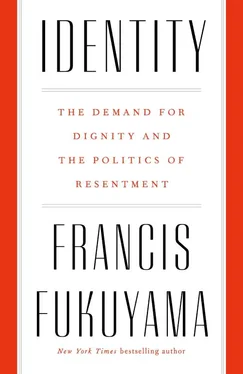Ernest Gellner was a major theorist of nationalism, and he suggested that modern Islamism needed to be seen through a similar lens of modernization and identity. Both nationalism and Islamism are rooted in modernization. The shift from Gemeinschaft to Gesellschaft has been occurring in the contemporary Middle East, as peasants or bedouin have left the countryside for cities such as Cairo, Amman, and Algiers. Alternatively, millions of Muslims experienced modernization by migrating to Europe or other Western countries in search of better lives, settling in Marseille or Rotterdam or Bradford and confronting there an alien culture. In other cases, the modern world came to them in their villages via satellite TV from stations such as Al Jazeera or CNN International. People living in traditional villages with limited choices are suddenly confronted with a pluralistic world with very different ways of life in which their traditional norms are not respected.
The identity problem is particularly acute for young second-generation Muslims growing up in immigrant communities in Western Europe. They are living in largely secular societies with Christian roots that do not provide public support for their religious values or practices. Their parents often came from closed village communities offering localized versions of Islam, such as Sufi saint worship. Like many children of immigrants, they are eager to distance themselves from their families’ old-fashioned ways of life. But they are not easily integrated into their new European surroundings: rates of youth unemployment, particularly for Muslims, are upward of 30 percent, and in many European countries a link is still perceived between ethnicity and membership in the dominant cultural community—an issue that we will return to in later chapters.
Under these circumstances, confusion about identity becomes acute, just as it was for newly urbanized Europeans in the nineteenth century. For some Muslims today, the answer to this confusion has not been membership in a nation, but membership in a larger religious group—an umma , or community of believers, represented by a political party such as Egypt’s Muslim Brotherhood or Turkey’s Justice and Development Party or Tunisia’s Ennahda. Like classic nationalists, contemporary Islamists have both a diagnosis of the problem and a clear solution: you are part of a proud and ancient community; the outside world doesn’t respect you as a Muslim; we offer you a way to connect to your true brothers and sisters, where you will be a member of a great community of believers that stretches across the world.
This assertion of pride in one’s identity may explain the cultural shifts that have been taking place across the Muslim world over the past generation. After a prolonged period in which it was fashionable for educated people from the Middle East to adopt Western customs and garb, a large number of young Muslim women in Egypt, Turkey, Jordan, and other Middle Eastern countries have started to wear the hijab or headscarf; some have taken to even more restrictive forms of female dress such as the full-face veil, or niqab. Many of these women are indeed pious Muslims, but others are not particularly religious; wearing the hijab is rather a signal of identity, a marker that they are proud of their culture and not afraid to be publicly identified as a Muslim.
Mainstream Islamist parties such as those mentioned above have been willing to participate in democratic politics and have won victories at the polls that have led them into government. Despite their public avowals of commitment to democracy, their secular opponents often remain highly suspicious of their long-term agenda. The same could be said about nationalists, either in the nineteenth century or today: they often play by democratic rules, but harbor potentially illiberal tendencies due to their longings for unity and community.
As was the case with nationalism, more extreme versions of politicized religion have been proffered by ideologists such as Osama bin Laden or Abu Bakr al-Baghdadi, the founder of the Islamic State. Their narrative is far more focused on victimization by the United States, Israel, the Assad regime in Syria, or Iran, and they advocate an even tighter community bound by a shared commitment to violence and direct political action.
The French Middle Eastern scholar Olivier Roy has pointed out that many recent terrorists, such as those who staged the Bataclan attacks in Paris in 2015, have a similar background: they are second-generation European Muslims who have rejected the Islam of their parents. (About 25 percent of the new generation of jihadis are converts to Islam with personal stories similar to those of jihadis who were born Muslim.) {7} 7 Olivier Roy, “France’s Oedipal Islamist Complex,” Foreign Policy , January 7, 2016; Olivier Roy, “Who Are the New Jihadis?,” Guardian , April 13, 2017.
In their early years they appeared to be westernized, drinking alcohol and smoking weed, dating girls, watching sports, and otherwise seeming to fit into their surroundings. Yet many failed to find regular jobs and began a descent into petty crime and run-ins with the police. They lived at the margins of their own communities, with no history of great piety or interest in religion, until they are suddenly “born-again” by watching videos of radical imams or being converted by a prison preacher. When they showed up in Syria with a long beard and toting an AK-47 or staged a murderous attack on their fellow Europeans, their families always professed surprise and incomprehension at the transformation. Roy has described this not as the radicalization of Islam, but the Islamicization of radicalism—that is, a process that draws from the same alienation that drove earlier generations of extremists, whether nationalists such as Paul de Lagarde or Communists such as Leon Trotsky. {8} 8 Richard Barrett, Foreign Fighters in Syria (New York: Soufan Group, 2014).
Roy’s profile suggests that the motives behind jihadist terrorism are more personal and psychological than religious and reflects the acute problem of identity that certain individuals face. Second-generation European Muslims in particular are caught between two cultures, that of their parents, which they reject, and that of their adopted country, which doesn’t fully accept them. Radical Islam by contrast offers them community, acceptance, and dignity. Roy argues that the number of Muslims who become terrorists or suicide bombers is minuscule compared to the total global population of over a billion Muslims. Poverty and deprivation, or simple anger over American foreign policy, does not inevitably lead people to extremism. Many terrorists have come from comfortable middle-class backgrounds, and many were apolitical and unconcerned with global politics for most of their lives. Neither these issues nor any kind of genuine religiosity drove them so much as the need for a clear identity, meaning, and a sense of pride. They realized that they had an inner, unrecognized self that the outside world was trying to suppress. {9} 9 See Omer Taspinar, “ISIS Recruitment and the Frustrated Achiever,” Huffington Post , March 25, 2015.
Olivier Roy has been sharply criticized for his interpretation of contemporary jihadism and his downplaying of its religious dimension, particularly by his fellow French scholar of Islam Gilles Kepel. Kepel argues that the turn toward violence and extremism cannot be understood apart from the religious doctrines being promoted around the world, and in particular the brand of ultraconservative Salafism exported out of Saudi Arabia. He accuses Roy and much of the French left for exonerating Islam by pretending that the problem of jihadism has little to do with a particular religion. Others have pointed out that many terrorists do not fit the description offered by Roy. {10} 10 Gilles Kepel, Terror in France: The Rise of Jihad in the West (Princeton, NJ: Princeton University Press, 2017); Robert F. Worth, “The Professor and the Jihadi,” New York Times , April 5, 2017; Robert Zaretsky, “Radicalized Islam, or Islamicized Radicalism?,” Chronicle of Higher Education 62 (37) (2016).
Читать дальше












